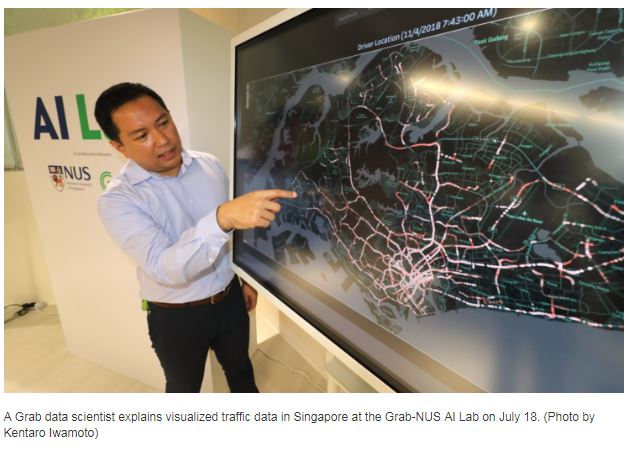Grab to tackle ASEAN’s traffic tangles amid antitrust pressure
SINGAPORE –Grab, Southeast Asia’s largest ride-hailing app operator, on Wednesday started a research laboratory for artificial intelligence here, aiming to better understand traffic patterns and offer faster ways to bring passengers to their destinations.
The Singapore-based company, which is under increasing scrutiny from competition regulators for its dominant market position, will share the findings with governments to help the region relieve its cities’ notorious traffic congestion.
The Grab-NUS AI Lab, created with the National University of Singapore and staffed with 28 researchers from both parties, is located in the university’s campus. Using Grab’s data on a total of 2 billion rides since its start in 2012, the laboratory will develop algorithms to find patterns and predict traffic flows.
Grab will use the research findings to improve the process of matching drivers with passengers, as well as share data with transport authorities in Southeast Asia so they can improve services by redesigning public bus routes and schedules, for instance.
Traffic congestion is one of the most serious challenges for Southeast Asia’s megacities.
“Millions of hours are wasted just being on the road,” Grab CEO Anthony Tan said at Wednesday’s event. “Think about the time that will be given back to every person to spend with their loved ones, or more hours in their office,” he stressed. With the research from the AI Lab, travel times in peak hours can be cut down by 30%, according to Tan.
The facility is also designed to develop local AI talent through the training of the university’s students. Grab could source more AI-proficient staff, which is increasingly needed by tech companies, from the laboratory.
Earlier this month, Singapore’s antitrust body said Grab’s merger with Uber Technologies has infringed the country’s competition law, arguing that the deal has significantly reduced competition in the market. The watchdog proposed remedies, and even warned it might require the companies to unwind the merger if the situation does not improve.
Moreover, the Malaysian transport ministry on July 12 tightened regulations over ride-hailing operators, applying the same rules as taxis, meaning Grab could face difficulties in retaining and acquiring drivers.
Given such problems, Grab has defended its contributions to the public. CEO Tan recently stated at another event: “We are one of the largest employers of engineering talent in Singapore. We brought global engineering talent into Singapore. We will continuously encourage innovation and the startup ecosystem in the region.”
The Grab-NUS AI Lab could serve as an example of cooperation that the company can cite in trying to convince Southeast Asian governments that they need its innovations.
At Wednesday’s launch event, which was attended by Singapore’s Education Minister Ong Ye Kung, NUS President Tan Eng Chye called the AI lab “an excellent example” of collaboration between industry and academic institutions in terms of providing learning opportunities for students.
Source: https://asia.nikkei.com/Spotlight/Sharing-Economy/Grab-to-tackle-ASEAN-s-traffic-tangles-amid-antitrust-pressure


 English
English





